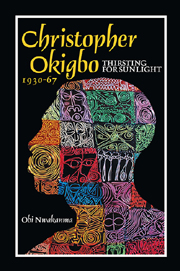Book contents
- Frontmatter
- Contents
- Preface
- Acknowledgements
- Chronology
- Dedication
- Photographs
- Maps
- Okigbo family tree
- 1 A river goddess, his mother's death & a headmaster father
- 2 Sportsman, actor & ‘effortless genius’
- 3 Cricket, classics, politics & urbane dissipation
- 4 Colonial civil servant, covert businessman & bankrupt
- 5 Poetry gives purpose to his voice
- 6 A librarian ravenous for literature & women
- 7 Gentleman, poet & publisher
- 8 Aftermath of a coup, running arms & advancing to death
- Epilogue
- Index
5 - Poetry gives purpose to his voice
FIDITI 1958–60
Published online by Cambridge University Press: 05 April 2013
- Frontmatter
- Contents
- Preface
- Acknowledgements
- Chronology
- Dedication
- Photographs
- Maps
- Okigbo family tree
- 1 A river goddess, his mother's death & a headmaster father
- 2 Sportsman, actor & ‘effortless genius’
- 3 Cricket, classics, politics & urbane dissipation
- 4 Colonial civil servant, covert businessman & bankrupt
- 5 Poetry gives purpose to his voice
- 6 A librarian ravenous for literature & women
- 7 Gentleman, poet & publisher
- 8 Aftermath of a coup, running arms & advancing to death
- Epilogue
- Index
Summary
Here rather let us lie in a new haven, drinking in the air that we breathe in until it chokes us and we die
(‘Debtor's Lane’)The year 1958 was most certainly Christopher Okigbo's annus horribilis. He had turned twenty-eight in August that year; at the prime of youth he was ambitious, driven – but suddenly a failure. He lost his place in the world. He could no longer maintain a gentleman's establishment, or keep a gentleman's easy manners; nor could he, as Malcolm Cowley expressed it, sustain ‘the magnanimity of a gentleman sure of tomorrow's dinner.’ He had become like the garret dwellers of Grub Street, subjects of Alexander Pope's venomous muse in the Dunciad, ‘whose lives were spent dodging the bailiff.’ To Fiditi he turned, and to the bohemian life of the poet.
The tone of ‘Debtor's Lane,’ the first poem he wrote soon afterwards, suggests that Okigbo contemplated suicide. But fate intervened in the form of Alex Olu Ajayi. Ajayi had nursed him back to emotional health, and convinced Okigbo to move with him to Fiditi to teach Latin and Greek in a grammar school for boys. Fiditi proved to be a balm on his wounded soul. This rural forest community lay twenty miles from Ibadan, the cosmopolitan capital city of the Western Region, on the way to the ancient town of Oyo, one of the important centers of Yoruba civilization. Fiditi was thus a gateway to both these cultural centers. Also Fiditi Grammar School lay on the main road to Ilorin so it was easy to commute to see Safi at Queen's School, Ilorin.
- Type
- Chapter
- Information
- Christopher Okigbo 1930–67Thirsting for Sunlight, pp. 121 - 145Publisher: Boydell & BrewerPrint publication year: 2010

